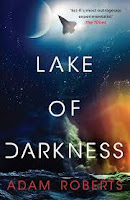I generally do not go in for Arthurian legend. While I recognize it's a critical piece of England's history and lore, and therefore of my own as an American, I subconsciously, and apparently consciously, don't jump with excitement seeing a book appear with an overt Arthurian theme. But descriptions of Lev Grossman's 2024 The Bright Sword, particularly the fact it seemed to brim with adventure and was in fact set in a time post-Arthur's passing, seemed to lend hope it might be more. Let's see how bright.
The Bright Sword follows the meta-quest of one Ser Collum to become a knight of the round table. Growing up parent-less in the northern isles, he eventually steals a set of armor and sword and sets off on a journey to Camelot. Now that Arthur is dead and gone, Collum finds only rough camaraderie among the motley crew of knights who are now at loose ends around the round table. But when a green knight shows up one day with tidings that one of the knight's of Arthur's table yet lives, the group sets off on a quest to find said knight. Adventure, as they say, ensues.






